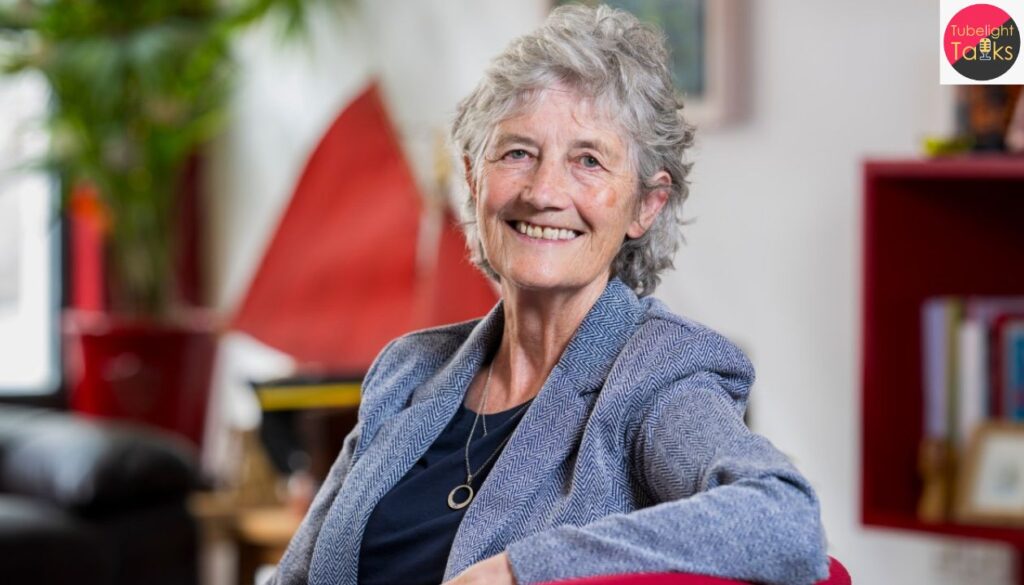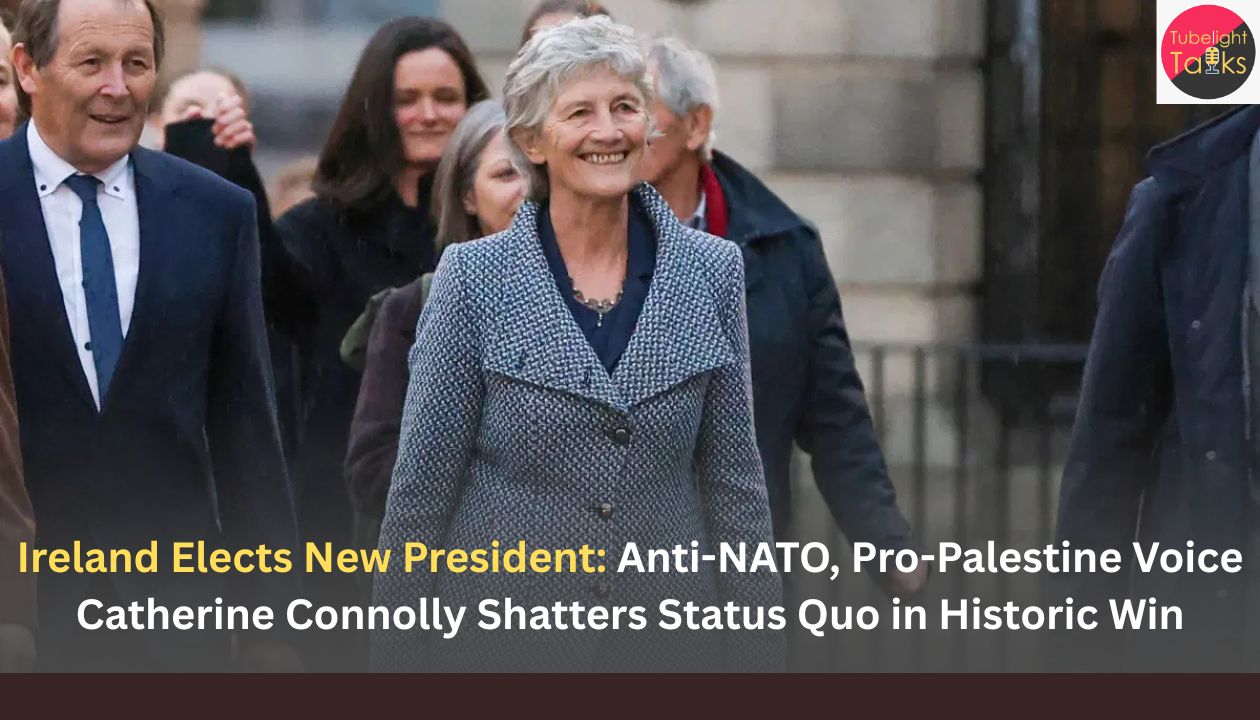Ireland Elects New President: Anti-NATO, Pro-Palestine Voice Catherine Connolly Shatters Status Quo in Historic Win
Ireland Elects New President: Connolly’s most scrutinised positions were those concerning foreign policy, which are well to the left of Ireland’s political mainstre. The political landscape of Ireland has been fundamentally shaken following the decisive election of Catherine Connolly as the nation’s 10th President. In a remarkable landslide victory that signaled deep voter frustration with the governing establishment, the independent left-wing politician secured over 63% of the vote, defeating the center-right standard-bearer, Heather Humphreys. Connolly’s win, fueled by a campaign focused on urgent domestic reform and an unflinching, controversial stance on international conflicts, has delivered a powerful political warning to Ireland’s coalition government.
Key Takeaways from the Catherine Connolly Presidential Victory
The election of Catherine Connolly is a crucial moment for Irish politics and its diplomatic identity, reflecting a convergence of domestic discontent and assertive foreign policy views.
- Decisive Mandate: Connolly, a veteran TD and barrister, won with 63% of the vote, a stunning margin that represents a major repudiation of the governing establishment.
- Anti-Establishment Drive: Her campaign, branded a “movement,” successfully tapped into public anger over the housing crisis, soaring rents, and economic inequality.
- United Left Coalition: The independent candidate successfully garnered the backing of nearly every major progressive bloc, including Sinn Féin, the Irish Labour Party, and the Social Democrats, bringing rare unity to the left.
- Controversial Foreign Policy: Connolly’s outspoken, pro-Palestinian position, which included frequently speaking of “genocide” in Gaza and calling Israel a “terrorist state,” dominated international scrutiny.
- Challenge to Neutrality: She is a fierce critic of NATO and European “militarisation,” advocating strongly for Ireland to build upon its policy of neutrality, a stance critics fear could alienate key allies.
- Election Discontent: The contest was marked by a low turnout of 46% and an unprecedented number of nearly 214,000 spoiled ballots, signifying widespread voter disaffection with the process and limited choice.
The Anatomy of a Landslide: How the Independent Prevailed
Catherine Connolly, 68, a politician with a background as a clinical psychologist, had been eyeing the presidency for years and was the first candidate to announce her run back in July. She was initially viewed as a long-shot outlier but rapidly gained momentum.
Coalition of the Discontented
Connolly’s path to victory relied heavily on her ability to unite various left-wing factions. She secured the necessary backing of over 20 members of parliament to get on the ballot, even before the highly strategic endorsement from Sinn Féin. The party’s decision not to run its own candidate, but instead throw its considerable organizational machine behind Connolly, was crucial, allowing the left to consolidate its vote against the two major governing parties, Fine Gael and Fianna Fail.
Campaigning That Connected
Her success was not just political; it was a triumph of authentic connection, particularly with younger voters. Her composed, yet eloquent, debating style—honed from her years as a barrister and TD (member of parliament) for Galway West—provided a sharp contrast to her rival.
Furthermore, her social media presence proved incredibly effective. She generated a viral moment with a video showcasing her “impressive athletic attributes,” performing keepie-uppies with a football and engaging in basketball, which was viewed hundreds of thousands of times and boosted her appeal to a youth demographic frustrated by the status quo.
A Race Defined by Early Exits
On the Israel/Hamas conflict, a subject of powerful national consensus in pro-Palestinian Ireland, Connolly took a maximalist position. She not only voiced frequent criticism of Israel’s “atrocities” and the “genocide” in Gaza but also sparked controversy by telling BBC News NI that Hamas was “part of the fabric” of Palestinian people. While she later clarified that she “utterly condemned” Hamas’s actions, her heterodox views remain a potential source of diplomatic “headaches with the country’s European neighbours.”
- NATO and Militarisation: She is a staunch critic of NATO and has blamed its eastward expansion for “provoking Russia’s war in Ukraine.” She also warned against the European Union’s “growing militarisation,” making comments that “seemed to compare German arms spending to Nazi-era militarization.”
- The Syria Trip: She faced lingering questions over a controversial 2018 “fact-finding mission” to Syria that included meetings with Bashar al-Assad’s regime representatives, with Connolly declining to disclose who paid for the trip.
Despite these views, she stated she would respect the ceremonial nature of her office, telling a TV debate she would not refuse to meet figures like US President Donald Trump for a “meet and greet.”
The President’s Role and Connolly’s New Republic

The President of Ireland, or Uachtarán na hÉireann, is a largely ceremonial and non-executive head of state with limited constitutional powers. The role does not permit the shaping of laws or government policy. However, the president holds significant soft power and moral authority, something her predecessor, Michael D. Higgins, often leveraged, to the private annoyance of ministers, by speaking out on issues like the housing crisis.
Connolly vowed to use her seven-year term to be an “inclusive president for all” and help the Irish people “shape a new Republic.” Her stated priorities reflect her core campaign themes:
- Peace and Neutrality: To be a voice for peace and build on the national policy of neutrality.
- Climate Change: To articulate the existential threat posed by climate change.
- Economic Accountability: To return a “substantial” portion of her presidential salary (around €350,000/£305,000) to projects.
- United Ireland: She actively sought to establish herself as a United Ireland candidate, with Sinn Féin leader Mary Lou McDonald believing Connolly will “exercise that soft power” and appreciate that “the preparation” for a United Ireland “needs to happen now.”
https://tubelighttalks.com/japans-first-female-prime-minister/Also read: Sanae Takaichi Becomes Japan’s First Female Prime Minister: A Historic Shift in Japanese Politics
Worldly Progress vs. Spiritual Transformation: A View from Saint Rampal Ji Maharaj
Global political achievements, like the rise of women to high office in Ireland and Japan, highlight progress, but Jagatguru Tatvdarshi Saint Rampal Ji Maharaj teaches that True societal change requires a spiritual solution. His unique knowledge emphasizes that all souls are equal, regardless of gender or status. He asserts that lasting justice and governance arise not from politics, but from a spiritual awakening and adherence to True devotion (Satbhakti) under the guidance of the Complete Guru. He offers the path to this True transformation. For More Information To understand the True spiritual knowledge and the path to a harmonious society, please visit: www.jagatgururampalji.org YouTube Channel: Sant Rampal Ji Maharaj
A Clear Mandate for Political Change
The election of Catherine Connolly is far more than a simple change of head of state; it is a profound signal that a significant portion of the Irish electorate is demanding a new political direction. Her landslide win represents a clear and vocal rebuke to the governing center-right establishment, powered by a rare alliance of left-wing parties and widespread public fatigue with domestic failures and economic inequality.
As she steps into the ceremonial role, her radical political history and outspoken views on global conflicts—from Gaza to NATO—guarantee that she will bring an unprecedented level of scrutiny and potential diplomatic friction, ensuring the presidency will continue to hold moral, if not executive, sway in the shaping of the Irish Republic’s identity on the global stage.
FAQs on Catherine Connolly’s Irish Presidential Win
1. Who won the Irish presidential election in the 2025 landslide?
The election was won by Catherine Connolly, an independent left-wing politician and veteran TD, who secured a decisive victory with over 63% of the vote.
2. Why is Catherine Connolly’s victory considered an anti-establishment result?
Connolly’s win was fueled by voter anger over the housing crisis and economic inequality, serving as a strong political rebuke to the governing center-right Fine Gael and Fianna Fail parties.
3. What is President Catherine Connolly’s view on the Israel-Gaza conflict?
She is an outspoken pro-Palestinian supporter, who frequently speaks of “genocide” in Gaza and has called Israel a “terrorist state,” while upholding Irish neutrality.
4. What are the major limits of the Irish President’s role?
The role is largely ceremonial and non-executive.The President acts as Head of State but cannot shape laws or policy and must act on the government’s advice.
5. Which major political parties backed Catherine Connolly’s campaign?
Connolly, an independent, was backed by a united front of major left-wing opposition parties, including Sinn Féin, the Irish Labour Party, and the Social Democrats.











Discussion (0)